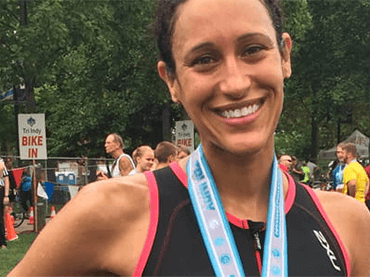The Challenge: Fat Pad Atrophy
Clarissa Collier, a clinical research associate from Fishers, Indiana, started noticing problems with her feet. Clarissa had danced since she was 13 years old and later became an avid triathlon competitor. But dancing and running hurt; even walking caused her pain. After visiting a doctor, she was diagnosed with plantar fasciitis, which affects the tissue along the bottom of the foot that supports and protects the foot’s arch.
Despite seeing different physical therapists and podiatrists who treated her plantar fasciitis, Clarissa’s foot pain persisted.
“I really wasn’t getting any better,” she says. “I suffered through that for a very long time.”
In 2014, after the birth of her son, Clarissa went to another podiatrist about her persistent, worsening foot pain. This doctor offered to give her cortisone injections to relieve the inflammation and pain.
The first two injections seemed to work, but as Clarissa continued to receive them, her skin became fragile and thin – so thin that, while getting a pedicure, the skin on the bottom of her heel ripped open.
Clarissa decided to get another opinion. A new doctor explained that the cortisone injections had atrophied the fat pad on her heel. Fat pad atrophy is a condition marked by the thinning of the protective fat cushion around the bones of the foot, which can make walking and other impact activities extremely painful.
The Path to UPMC: Clinical Trials
By this point, Clarissa had stopped running and dancing because both activities caused her too much pain.
“I was desperately searching for a doctor who could help me,” she recalls.
As a researcher, Clarissa thought to turn to ClinicalTrials.gov. She hoped to find a trial that might help her.
Online, Clarissa came across a clinical trial that was headed by Jeffrey Gusenoff, MD, a UPMC plastic surgeon, and Beth Gusenoff, DPM, a podiatrist and assistant professor at the University of Pittsburgh. This husband and wife team had developed a novel procedure involving fat grafting to the feet to treat patients with fat pad atrophy. Today, foot fat grafting is out of the clinical trial phase and offered as an elective procedure.
Clarissa reached out to Dr. Beth Gusenoff, who told her she’d be a good candidate for heel fat grafting. In the spring of 2016, Clarissa traveled to Pittsburgh for a consultation.
The Solution: Heel Fat Grafting
While there was no guarantee the procedure would solve all of Clarissa’s problems, she decided to undergo heel fat grafting with the two doctors.
In this procedure, fat cells are harvested through liposuction of the belly or thighs, then processed. The fat cells are injected into the affected area of the foot to increase its cushion, with the goal of minimizing pain on impact.
Though the procedure was “no walk in the park,” Clarissa had a positive experience thanks to the care of her doctors.
“Beth and Jeff really put my mind at ease,” Clarissa says. “They were very attentive and set realistic expectations. They made me feel like it was going to work.”
Clarissa would eventually be cleared to run and dance, but first she had to learn how to walk normally again. Since she had spent years walking on her tiptoes to alleviate the pain, it took some time to adjust to walking on her heels. Clarissa wore an orthopaedic boot for a month before transitioning to a shoe. Then, she used crutches for a few weeks until she could walk on her own.
The Results: Competing Again
A few months after her heel fat grafting procedure, Clarissa ran a half Ironman with no foot pain. As of 2018, she’s competed in nine triathlons.
“My recovery is at about 90 percent, but I’m cautious about distance,” Clarissa says. “The road to being able to feel normal again – that was a long haul. You have to stick with it, but the results are worth it. This is my second chance at having a quality life.”
If you, or someone you love, are interested in foot fat grafting for fat pad atrophy or plantar fasciitis, contact us to schedule a consultation: 412-641-3960.

















